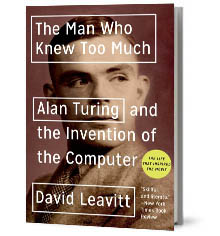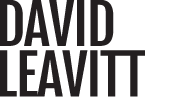Non-fiction
THE MAN WHO KNEW TOO MUCH: ALAN TURING AND THE INVENTION OF THE COMPUTER
ATLAS/NORTON, 2006
One of the most important openings in the path to the modern computer was made by the British mathematician Alan Turing—remarkably, while he was solving an entirely different problem. Shy and insecure about his middle-class origins, considered eccentric by those who did not know him well, Turing could show those close to him sly humor and bracing candor—even about his homosexuality. He also had one of the keenest minds of the twentieth century.
Turing's famous 1936 doctoral dissertation tackled one of the great mathematical challenges of all time, the “decidability problem,” by proposing an imaginary programmable calculating machine. The idea of actually producing such a “Turing machine” did not crystallize until Turing and his brilliant Bletchley Park colleagues built devices to crack the Nazis’ Enigma code. Along the way, Turing crossed paths with some of the greatest minds of his time, including John von Neumann and Ludwig Wittgenstein.
After the war, Turing became a champion of artificial intelligence, formulating the famous Turing test that challenges our ideas of human consciousness. But Turing’s postwar computer-building was cut short when he was arrested for violating antihomosexuality laws and sentenced to a “treatment” that amounted to chemical castration.
The Man Who Knew Too Much explains Turing’s work and explores the connections between his genius and his short, brave life. It is published by W. W. Norton.
BUY Amazon barnes & noble indiebound
ON the man who knew too much
“David Leavitt’s new biography of Turing, The Man Who Knew Too Much, is part of W. W. Norton’s ‘Great Discoverie’ series, two other volumes of which also deal with mathematical subjects. Each of the three books was written by a prominent writer of fiction without specific mathematical expertise…all in all, Leavitt has done an admirable job. He has worked through Turing’s groundbreaking paper, which was written for professional mathematicians, and has done a commendable job of explaining it to his audience. His discussion of the German ciphers and what it took to break them is also quite detailed. The book is beautifully written, and the errors that will irritate an expert won't be noticed by most readers*…It is in his empathy for Turing’s situation as a homosexual man living in a hypocritical, sexually repressive society that Leavitt really shines.”
—Martin Davis, American Scientist
*Errors in the original hardback edition were corrected for the paperback and e-book.
“Advanced mathematics is a hard sell, but David Leavitt’s biography of Alan Turing…will give even the most innumerate reader an idea of the beautiful and fascinating world he is missing.”
—The Economist
“Leavitt deals decently with Turing’s maths, with the vital breakthroughs he made at Britain’s second-world-war code-breaking center at Bletchley Park, and with his post-war career, but the biography’s real strength is the sympathy Leavitt brings to describing his subject’s mental state. The repeated parallels he draws between Turing’s status as a homosexual and his writings on why artificial intelligence was not necessarily less intelligent for being un-human are deft and convincing.”
—Robbie Hudson, The Sunday Times (London)

Foreign Editions
Novo Conceito (Brazil)
Hunan Science & Technology (China)
Dokoran (Czech Republic)
Dunod (France)
Arieh Nir (Israel)
Codice (Italy)
Wave (Japan)
Seung San (Korea)
Heliks (Serbia)
Antoni Bosch (Spain and Latin America)
Weidenfeld & Nicholson (UK and Commonwealth)
notes
I talk about the Turing Problem with James Gleick and Janna Levin on NPR’s RadioLab.
I talk about Alan Turing’s centenary with Ira Flatow on NPR’s Science Friday.
Codebreaker, the Channel 4 documentary about Alan Turing in which I am featured, is now being screened across the United States.
